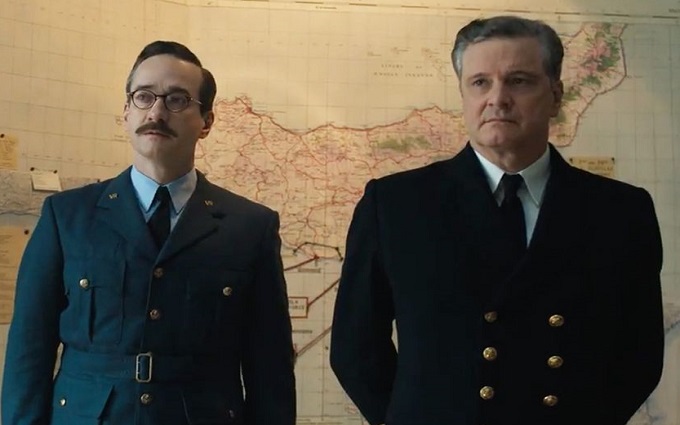Colin Firth Operation Mincemeat Trailer

World War II drama Operation Mincemeat depicts the real life efforts of British Intelligence to sensationally trick the German military command by planting false information in papers on a dead body of a British soldier left to wash ashore in enemy controlled waters.
Shakespeare In Love and Best Exotic Marigold Hotel Director John Madden helms the project with Colin Firth and Matthew McFadyen playing the real life duo who initially concocted the elaborate scheme to deceive the Nazi War machine at a crucial moment in World War II.
The film also stars Johnny Flynn as Bond author and real life intelligence officer Ian Fleming, alongside Penelope Wilton, Jason Issacs, Kelly MacDonald and Simon Russell Beale.
Check out the official trailer below with the film due to wash ashore into in UK cinemas in January 2022…
Belfast TIFF Review

The Plot
An Ulster Protestant families’ life in Belfast during the height of the infamous ‘Troubles’ in Northern Ireland in 1969 is retold form the perspective of their nine year old son Buddy.
The Good
Award winning director Kenneth Branagh has described Belfast and his most deeply personal film to date. That earnest and intimate act of uninhibited personal storytelling is laid bare in both a finely worded script and well-crafted direction. The result is a shamelessly crowd pleasing tale that is drenched in affectionate nostalgia and teary eyed poignancy. The deep connection between one boy’s transformative childhood experiences and the tumultuous upheaval in a vibrant and uniquely complex community is a powerful piece of narrative framework that enables the film to speak to a wide and deeply affected audience.
Branagh is assisted in his storytelling ambition by a truly all star cast with Catriona Balfa, Jamie Dornan, Ciaran Hinds, Colin Morgan and Dame Judi Dench all on excellent form in a memorably brilliant ensemble. In a true star making performance the film’s young leading actor Jude Hill also provides the film with the heart and humour of an authentically childlike perspective.
The film might be accused of being overly sentimentalised, but it does feel like a truly authentic tribute to an ultimately uplifting childhood set against the backdrop of an admittedly painful collective history and complex social struggles. The film is alluringly imbued with an affectionate array of earnest energy
The Bad
Those who have their own personal recollections of this period of Irish history or ardent views about the admittedly sensitive and enduringly complex social situation in Northern Ireland, may of course find that their own emotions and opinions aren’t entirely matched with those captured in this film. In particular perhaps more cynical critics will suggest the film presents an overly simplified or saccharine view of a difficult world, filtered explicitly through childish eyes.
Likewise those who find themselves irrationally off put by the mere sight of a prepubescent protagonist may be a tougher audience for Jude Hill’s star making turn as Buddy.
But that shouldn’t really been seen to diminish the films broad appeal and undeniably fine qualities.
The Ugly Truth
As a crowd pleasing piece of well-crafted childhood reminiscences, Belfast serves up a delightful cinematic treat that is almost certain to be richly acknowledged come awards season. The deeply personal project represents an undisputed high point in Kenneth Branagh’s career behind the camera.
The Power Of The Dog TIFF Review

The Plot
A slow burn western drama set in 1925 following the Burbank brothers, a pair of wealthy Montana ranchers. When George Burbank unexpectedly brings home a new wife Rose and her existing son Peter, it triggers a menacing campaign of cruelty and psychological torment from his tyrannical brother Phil. Setting the new ‘family’ on a tense and perilous path toward possible destruction.
The Good
Director Jane Campion brings her much celebrated talents for tense drama and sumptuous visuals firmly to bear on a palpably menacing tale of repressed desire and cruelty. The Power Of The Dog is an openly hostile and terse examination of familiar Western tropes that will captivate considerable compulsive viewing thanks to a barrage of talented performances from an all-star cast. Understated and relentlessly intense it’s an unapologetically challenging piece of fraught psychological drama that rides towards some truly unexpected conclusions.
Benedict Cumberbatch expertly transforms his quintessentially British charms into an authentically menacing presence as a tyrannically hard edged Montana rancher. As the film’s cruel antagonist Cumberbatch absolutely excels in injecting layers of inner turmoil and seething toxicity into the character. The Sherlock and Star Trek star has always been able to adeptly turn his cold eyed stare and hard spoken eloquence into powerful villainous weapons. Yet again he does so to excellent effect in a compelling performance that paints rancher Phil as dangerously harsh and fragile.
Alongside Cumberbatch’s totemic performance the real life pairing of married stars Jesse Plemmons and Kirsten Dunst as the couple caught in the crosshairs of Phil’s cruelty provides the film with a ready-made understated emotional authenticity. Both Dunst and Plemmons are on typically fine form as the victims of toxic torment struggling to navigate a path to happiness in the face a truly menacing obstacle.
Kodi Smitt McPhee likewise is an invaluable asset to the film as Rose’s seemingly mild mannered son Peter. His character instantly becomes the explicit battleground over which Phil launches his sustained assault on Rose and any hopes of coexistence within the newfound Burbank family. Phil’s openly bullying hostility and tense proximity to Peter throughout the film is precisely what creates an ominous sense of danger and ultimately drives the story towards truly unexpected end games.
Kodi Smitt McPhee’s performance is certain to garner awards attention and firmly establishes that his talents extend far beyond playing smaller roles in blockbuster franchises like X-Men. He belongs firmly alongside top billed acting powerhouses with star billing. Although he may possibly find it a little hard to quickly shake off this career defining role as Peter.
The Bad
The Power Of The Dog has the familiar visual landscape of a traditional western, but beneath that superficial similarity of setting it is actually more of an aggressive deconstruction of the eternally popular genre than an actual true ‘Western’. While some people will welcome a sluggishly paced meditation on ‘toxic masculinity’ it obviously won’t satisfy anyone expecting the typical crowd pleasing delights of a conventional ‘western’.
While director Jane Campion might clearly intend to hijack and explicitly confront the alleged ‘myths’ of admirably heroic hyper-mascuiline cowboys that the western genre traditionally exists to celebrate; that obviously won’t be a particularly pleasant or welcome character assignation for some audiences.
Despite the film’s attractive cinematography and arresting score, its unapologetically languid and brutal slow burn drama might still prove somewhat offputting for those that find its’ relentlessly brooding tone to be genuinely uncomfortable viewing. Others may also find some of the films tropes about emotional repression to be a little too heavy handed in places. Leaving the film with less of a deconstructive shock value than it perhaps aspires to deliver.
The Ugly Tuth
Undeniably beautiful on screen thanks to expertly moody cinematography, The Power Of the Dog is a seemingly inevitable awards contender that will attract a large audience due to its abundant star power, though might not satisfy those seeking a more conventional western. Slow paced, bleak, serious and by turns shocking it’s a film that at the very least commands attentio
Last Night In Soho TIFF Review

The Plot
A 60’s obsessed modern day fashion student finds herself seemingly magically transported each night from her bedsit to the lurid and dangerous world of 1960’s London nightlife. Her visions of the mirrored life of wannabe singer Sandie quickly posing strange questions about whether these are purely figments of imagination or a genuine ghostly connection across generations.
The Good
Edgar Wright is a director of distinctive and unique style. His flair for eccentric visuals, compelling camerawork and pop culture infused musical masterclasses have been long celebrated. They’re all tools that make him ideally suited to breathing surreal dream like life into a script from Oscar nominated screenwriter Krysty Wilson-Cairns.
The films unapologetically dizzying descent into flashbacks of a neon drenched nighttime wonderland of London’s swinging sixties heydays is a unique form of frenetic escapism. Those that have habitually enjoyed Wright’s past cinematic treats will welcome his unleashed explosion of imagery and ideas.
Wright’s best loved work has always toyed with an alluring mix of cinematic nostalgia and jukebox musical charm. In a way this latest offering boldly stretches this even closer to being a full blow musical that is lush, eerie and evocative by equal measure. Packed with plenty of familiar cinematic references for enthusiastic film buffs the combined result is a truly original creation driven by deeply personal undertones.
Alongside the film’s lurid visual charms competent performances from stars Thomasin McKenzie and Anya Taylor Joy and menacingly murderous perils of London’s toxic underbelly make the experience even more compelling.
The Bad
While the film’s explosive barrage of ideas, themes and visuals is an initially immersive and rewarding escape, it’s also fair to admit that the film as a whole is somewhat overwhelmed at times by the sheer weight of its combined elements. It’s clearly hard beyond a certain point for the film to sustain it’s early exhilaration and service the competing needs of being a nostalgia drenched surreal musical horror thriller..
Though the film’s purposefully sleazy and dark edged underbelly does inject a sense of peril to proceedings it obviously also prohibits the film from being the kind of whimsically escapist fun that might be more universally appealing. Likewise the swirling mess of ghostly dreams within dreams makes it a little difficult to sustain a coherent conventional plot. Audiences hoping to cling to a simple narrative structure and straightforward message might find this film’s hazy fog of ideas much harder to grasp hold of.
The Ugly Truth
Director Edgar Wright delivers another eccentric musical masterclass with a luridly dream like dive into the delights and darkness of 1960s London nightlife. For fans of his past work and those similarly drawn to this alluring period of the past it will be an especially crowd pleasing if sometimes nightmarish dream.
Spencer TIFF Review

The Plot
Set in 1991 this historical fiction turns Princess Diana’s existential crisis over her potential divorce from Prince Charles into a psychological drama. Set over a tense holiday period in confines of the Queen’s Sandringham estate the film explores the suffocating claustrophobia of Dian’s Royal life during the tumultuous dying stages of her infamously doomed marriage to the future king of England.
The Good
Twilight star Kristen Stewart has worked hard to shed the reluctant mantel of Hollywood Starlet by focusing almost exclusively on serious dramatic work in low budget dramas. That path has led her to the opportunity to play one of the most iconic women of the 20th Century on screen in a credible project from an accomplished screenwriter and director. Stewart earnestly seizes the opportunity, physical and vocally transforming herself into the iconic Diana to an extent that will almost certainly see her attracting numerous awards nominations.
Beneath a mop of Blonde hair and armed with a mostly convincing British accent, Stewart does her very best to do justice to the role and transform Princess Diana’s supposed ‘darkest days’ into an arresting descent into mental turmoil and an ultimately cathartic emergence.
For those that are addicted to the real life and fictitious royal drama this will be another sumptuously set slice of familiar storytelling. Likewise younger generations perhaps lured in by Stewart’s appeal will find the sombre events of this royal era conveniently reimagined as a suitably gripping and overtly symbolic psychological drama.
The Bad
Between Netflix’s onging series The Crown and several other biographical films of vastly varying quality the absurdly well publicised and infamous personal struggles of Diana Princess of Wales have already been painstakingly examined and laid fully bare for audiences on numerous occasions. So however well-intentioned or written any fresh ‘take’ on this well-known and ultimately tragic public figure is, there will always be difficult questions for it to answer about how respectful or necessary it is to regurgitate relatively recent history on screen.
It certainly doesn’t hold any educative value as Diana herself was overly open about every intimate detail of her own life. So at best any ‘new storytelling’ can only really serve as crowd pleasing entertainment. Unfortunately as with all ‘fictionalised’ historical dramas there’s a very real risk that this ultimately serves to entrench historical inaccuracies and rewrite the innermost lives of public figures in a more crowd-pleasing and dramatic way.
At times it’s perhaps difficult for audiences to connect the coldly cruel and elitist pantomime villains the British Royal family are so often portrayed as, with the increasingly geriatric and seemingly docile reality. Likewise this film’s subplots about Diana feeling herself haunted by the ghost of Anne Boleyn, a contentious pheasant hunt and an intensely dependent friendship with a fictions royal dresser largely feels like clumsy and convenient shorthand.
Overall despite seemingly well intentioned performances from Stewart and a strong supporting cast there’s plenty of grounds to accuse the film of exploiting poetic licence too much in transforming Diana’s ‘imagined’ private life into a well-dressed royal soap opera.
Even if supposedly merely symbolic, the film’s brazen choice to portray Diana as suffering from hallucinatory and suicidal mental turmoil before emerging into a rose tinted escape as a KFC munching people’s princess and newly empowered mother/woman raises some difficult questions
The Ugly Truth
Spencer is a suitable star vehicle for Kristen Stewart that mostly re-treads and questionably reimagines relatively recent and overly familiar Royal history. Those addicted to The Crown will certainly be compellingly intrigued by this more anguished and sensationalised exploration of Diana. While others will inevitably feel that yet another dramatization of the ‘fictional’ private life of one of the most famous and overly publicised women of the 20th Century is largely unnecessary and perhaps even unwelcome.